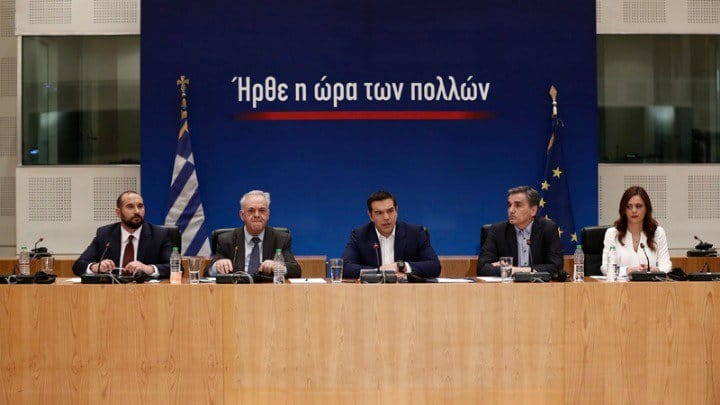
Greece’s Prime Minister Alexis Tsipras presented a new round of social welfare and anti-austerity measures at the Zappeion Megaron on Tuesday evening.
Prior to the announcement Tsipras acknowledged that a large part of Greek society has endured a disproportionate burden in the years of the financial crisis, as the country came out of a very tough adjustment period of eight years and is now ready to see some results.
Greeks, he said, who endured this difficult time, will now “taste the fruits of their sacrifices.”
These measures, designed to “support the social majority,” as Tsipsas said, are divided into two categories – measures that will be legislated and implemented in the rest of 2019 and those to be implemented in 2020 and be later legislated. The latter will be included in the 2020 budget anyway.
“All measures will be permanent, not temporary,” Tsipras underlined. There is a margin of liquidity of at least 31 billion euros in the state coffers, said the Greek premier, and added that after four years in power, SYRIZA has managed to create this reservoir on top of Greece’s ability to borrow at the cheapest interest rates it now enjoys. He explained that about half of this liquidity reserve is the so-called European Stability Mechanism (ESM) security ‘pillow’, while the rest comes from revenues from the implementation of austerity cuts, “the burden of the Greek people during the crisis.”
Some 3.6 billion euros of this reserve will go towards early repayment of one of Greece’s ‘strictest lenders’, as Tsipras called the International Monetary Fund, thus saving millions of euros annually in interest rates.
Another 11.5 billion euros will be used for Greece’s final exit from the crisis, and said that some 5.5 billion euros from this amount will be put into a special account in the next few days, equivalent to 3% of GDP, as collateral against Greece’s lenders over the next three years, 2020-2023.
The 11.5 billion “will be our guarantee they (the creditors) will get the money that corresponds to the level of primary surpluses that we have agreed will be reached by 2022, i.e. the annual 3.5%,” he added.
The funds in this special account will give Greece an annual 1% of GDP flexibility margin so as to continue targeting a visible 3.5% annual primary surplus rate, “thus staying within all that we have agreed with our creditors,” Tsipras said, “but allow us to plan, economically, for years 2020-2023 under a 2.5 primary surplus percentage,” he added.
Specifically, the measures to be implemented as of 2019 include the provision of a permanent 13th pension at a cost of 800 million euros, a reduction of VAT from 13% to 11% in general goods and services, tax cuts for island residents and further reduction of heating costs in mountainous areas.
Also importantly, VAT on all foods is cut from 24% to 13%, excepting alcohol and other drinks, at a cost of 260 million euros, while VAT on electricity and natural gas is cut down from 13% to 6%.
In 2020, Alexis Tsipras said, the total value of the package of measures is about 1.3 billion euros, and includes a further reduction VAT in goods and services from 13% down to 11%.
Tsipras also said that in 2020 the reduction of the so-called Solidarity Fee tax on annual incomes will be reduced by up to three percentage points for annual incomes up to 30,000 euros, and down to zero percent for incomes under 20,000.
“We ask for the Greek people’s confidence vote on the May 26 European elections, on the new positive measures we announced today,” said the Greek PM, “and the people’s approval on the October 2019 national elections so that we can fully implement them,” referring to the national elections at the end of his government’s term.

